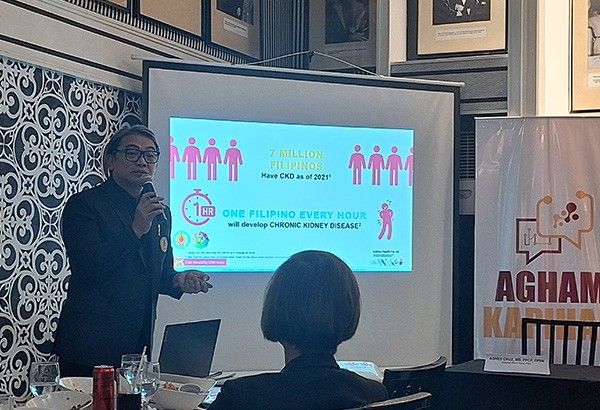'Don't abuse pain relievers': 8 'golden rules' to avoid Chronic Kidney Disease

MANILA, Philippines — In pain? Pain killers might provide instant relief, but doctors caution against frequent intake of these as these might cause more harm than good, especially to the kidney.
Refraining from taking excessive amounts of pain killers is one of the tips that doctors from the Philippine Society of Nephrologists (PSN) advocate to mitigate the growing incidence of Chronic Kidney Disease in the country.
The National Kidney Transplant Institute (NKTI) in May said that it noticed a 40% increase in new dialysis patients.
NKTI Deputy Executive Director for Medical Services Dr. Romina Danguilan said that currently, the center has about 60,000 patients on dialysis. The doctor said the center caters to a yearly estimate of 35,000 out-patients and 27 in-patients, 80% of which have kidney diseases.
These numbers are alarming. PSN has been advocating for early detection and treatment of Chronic Kidney Disease or CKD in time for the National Kidney Month celebrated every June.
Among its programs is "Stop CKD," launched in 2022 in Cebu.
PSN Secretary and nephrologist Dr. Vimar Luz said a kidney disease is chronic when the disease or damage to the kidney does not heal for more than three months.
Dr. Luz was among the panelists at the first-ever "Agham Kapihan," a series of media roundtable discussions on science and health issues and advocacies. The forum is supported by AstraZeneca as part of its commitment to improving the lives of millions of patients together with its partners across the healthcare ecosystem.
The kidney is an important organ as it helps in the removal of the body's toxins and in regulating electrolytes and blood pressure, among others.
At the end stage of CKD, where dialysis is commonly prescribed, signs and symptoms of the disease include fatigue, poor appetite, edema, nausea, itchiness, insomnia and presence of blood or protein in urine.
Early detection through annual checkups, which includes urinalysis, could help spot the early stage of the disease.
Here are the eight rules that PSN advocates to help fight Chronic Kidney Disease:
1. Exercise regularly
Dr. Luz said one should maintain one's ideal body weight. Daily exercise, such as walking, helps.
2. Avoid ultra-processed food and observe a healthy diet
The more natural the food is, the better. Ultra-processed food refers to those that have undergone changes and takes another form from its original state, such as junk food and sugary treats.
Dr. Luz also stressed that one's daily salt intake should be at 5 to 6 grams.
3. Control blood sugar
Along with a healthy diet, watching out for one's blood sugar is also recommended. Those who are predisposed to diabetes are doubly cautioned to regularly check their blood sugar.
4. Control blood pressure
Apart from blood sugar, blood pressure should also be monitored, especially among the elderly and middle-aged. The normal blood pressure in adults is 120/80.
5. Drink adequate water
Always keep oneself hydrated. Consumption of enough water is crucial to maintaining kidney health.
6. Stop smoking
Smoking cessation is a general health advice. Stopping one's smoking habit can help in preventing stroke, heart attack and other complications.
7. Don't abuse pain relievers and supplements
The doctor said that it is best to consult a physician before taking any form of supplement. Some herbal products, for instance, have nephrotoxins, which are chemicals and medications that are toxic to the kidney and its functions.
Dr. Luz said that excessive intake of pain relievers and supplements can lead to kidney damage.
8. Seek regular checkup
Annual medical checkups help one to determine the state of one's health. A regular checkup is recommended for those at risk of developing CKD. Those who are at risk are those with Diabetes, Hypertension, obesity and with family history of kidney disease.
"When it comes to cardio-metabolic diseases, hindi pwede gamutan lang 'yan. Merong change of lifestyle, especially in prevention, may part of education. Like they say, prevention is always better than cure," said Dr. Luz.
RELATED: How to prevent kidney disease



















